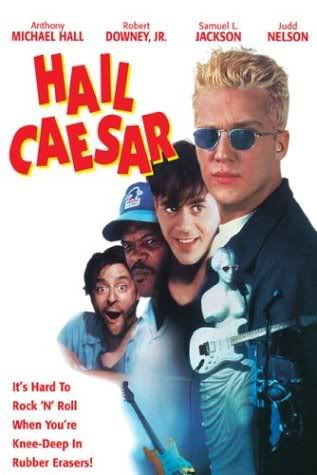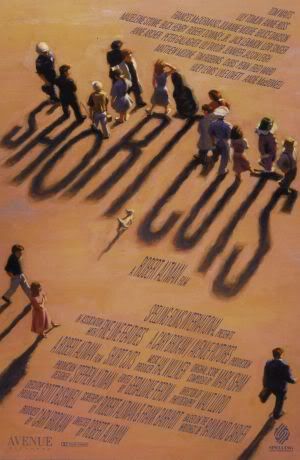
Hail Caesar
By Peter John Gardner
One of the main reasons I decided to take on the work of Robert Downey Jr. after the completion of Project Stallone was because I thought that films featuring Downey would typically be better than the majority of Stallone films I had to endure, thus making this project a little more painless. I thought I was right until I got to Hail Caesar.
In one sentence, this movie is basically Anthony Michael Hall's masturbatory fantasy about being a rock star. Directed by Hall, the film follows Julius Caesar (yes, that's his character's actual name) on his quest for fame and the approval of his girlfriend. Caesar as a character isn't likeable at all, and he comes across less like an early 90s alternative rocker and more like some douchebag fraternity boy that happens to know how to play a little bit of guitar. Oddly enough, Hall bears more than a passing resemblence to FOX News's misinformant Glenn Beck so the movie is a lot more fun if you pretend that it's Glenn Beck and not Julius Caesar.
The plot finds Caesar with his struggling rock band that makes Bill & Ted's Wyld Stallions look like The Beatles trying to catch a break. At the same time, Caesar is dating the daughter of a wealthy eraser factory owner that is obsessed with guns and Ronald Reagan. His daughter is a complete, hoighty toighty snob that seems to have nothing but contempt for Caesar, leaving the viewer to wonder why they're even dating. Dad's not too fond of his daughter dating a "lower class" rock musician, so he hatches a plan to get Julius out of the picture. In order for Caesar to continue dating this uppity wench, he has to come up with $100,000 within six months. For some reason that is never explained, the dad gets Caesar a job at the pencil eraser factory to help get him started. Soon enough, Caesar is promoted to manager and uncovers some sketchy activities going on at the factory that he can use as blackmail. Hijinks ensue as well as cocaine fueled cameos from Judd Nelson, Samuel L. Jackson, and Robert Downey Jr. Downey's role is as a record label exec whose first appearance is preceded by a bizarre dance sequence in his office than can only be explained by the use of cocaine from everyone involved.
This film is an unfunny mess with vague themes of true love and not "selling out". Since Anthony Michael Hall didn't really sell me on his role as a struggling musician, and Downey's appearance is the cinematic equivalent of an all night cocaine bender, I'm going to focus instead on Samuel L. Jackson's role as the mailman. It's a small role, and most of the time Jackson is getting attacked by the dogs at Caesar's house. He eventually quits the mailman job and takes on other thankless jobs, like digging a hole in front of the Caesar house.
"Four years of college for this?" mutters Jackson. Jackson's character obviously was an English major in college. English majors typically go through four years of school to arrive at two destinations: a) Become an English teacher, or b) Do something that has nothing to do with English where you frequently get shit on, take on mundane jobs, and wonder why you spent all that money on tuition. Life frequently puts me in positions where I'm just doing what I'm supposed to do, and instead of an obstacle or challenge, it's a fucking dog chasing after me that I have to deal with (metaphorically speaking, of course). You can't fight the dog, that would be animal cruelty. You have to run away and hope that you don't get a piece of flesh ripped off of your leg.

